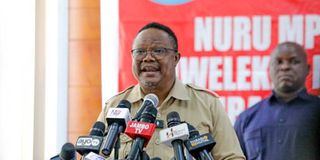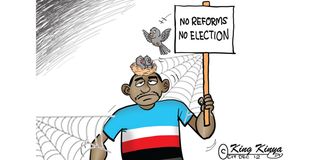Reasons behind Lissu's bid for Chadema's chairmanship

The vice chairman of the main opposition party, Chadema, Mr Tundu Lissu addresses a press conference in Dar es Salaam on December 12, 2024. PHOTO | SUNDAY GEORGE
What you need to know:
- The move to vie for the chairmanship comes amid growing calls within the party for renewed leadership and strategic direction as it positions itself to challenge the Chama Cha Mapinduzi (CCM) 's dominance.
Dar es Salaam. Firebrand opposition figure and Chadema stalwart Tundu Lissu has officially declared his intention to run for the party’s national chairmanship, citing the need to preserve Chadema's leadership legacy and to adopt a fresh strategy to confront the country’s shifting political landscape.
Speaking to the press in Dar es Salaam today, Mr Lissu announced that he had withdrawn his previous application to contest the position of vice chairperson and had instead submitted his candidacy for the top leadership position.
“With the qualifications I possess, I believe, and I would like to believe, that my fellow Chadema members also believe that I have sufficient qualities to contest for the highest position in the leadership of our party, the chairperson position,” Mr Lissu said.
This development represents a significant shift in Chadema’s leadership dynamics, with Mr Lissu now seeking to succeed current Chairman Freeman Mbowe, who has held the position since 2003.
According to Mr Lissu, his decision follows years of calls from party members and leaders urging him to contest the chairmanship.
Reasons for his decision
Lissu’s decision to vie for the chairmanship is deeply rooted in a belief that Chadema’s legacy requires a leadership model that embraces change.
Drawing inspiration from the party’s founding fathers, he highlighted the smooth leadership transitions of former chairpersons Edwin Mtei and Bob Makani.
Both leaders voluntarily stepped down after serving a single term—a tradition Lissu aims to preserve.
“Our elders understood the importance of not clinging to power. They did not want to stay in office until they were forced to leave in disgrace. They prepared a system of orderly transition through constitutional procedures,” he said.
Mr Mtei served as Chadema’s first chairman from 1993 to 1998, after which he retired voluntarily. Similarly, Bob Makani served from 1998 to 2003 before being succeeded by Freeman Mbowe.
“All these leadership changes at the top of our party were made through elections according to the party’s constitution. No chairman has ever been given the chairmanship as a favour or a gift but rather through election,” Lissu shared.
A call for new leadership and strategy
Beyond the legacy of orderly transitions, Mr Lissu’s decision is also informed by the current political climate in Tanzania.
He argues that the country's shift toward what he described as ‘authoritarian politics’ requires a new approach.
“Since 2015, Tanzania has entered an extraordinary period in its history. Analysts of Tanzanian politics have called it an authoritarian rule that does not allow electoral competition,” Mr Lissu said.
He attributed this shift to the tenure of former President John Magufuli, during which opposition candidates were disqualified en masse in the 2019 local government elections and the 2020 general elections.
Mr Lissu himself survived an assassination attempt in 2017, which he has linked to his vocal criticism of the John Magufuli administration.
According to Mr Lissu, this ‘authoritarian system’ has persisted even after President Samia Suluhu Hassan took office. He argues that promises of democratic reforms under President Samia’s leadership have not been fulfilled.
“Despite her promises of change, there have been no meaningful reforms. The constitution remains unchanged, the laws and electoral system remain the same, and the government officials who oversaw past flawed elections have remained in place,” he said.
Mr Lissu’s campaign will focus on a renewed push for constitutional reform, an independent electoral system, and a commitment to justice and human rights.
‘No Reforms, No Elections’
In a bold statement, Lissu declared that Chadema's new slogan moving forward should be “No Reforms, No Elections.” He believes that the party should not participate in elections unless substantial changes are made to the country’s electoral framework.
“We now need to return to our core agenda—a new democratic constitution, an independent electoral system, and justice for all. Our new slogan should be ‘No Reforms, No Elections,’” he declared.

To achieve this, Mr Lissu outlined the importance of raising the morale and fighting spirit of Chadema’s leaders, members, and supporters. He emphasised the need for a new leadership style, different from past approaches that prioritised reconciliation over confrontation.
Mr Lissu positioned himself as the ideal candidate for this pivotal moment in Tanzania’s political history. He cited his track record of integrity, patriotism, and an unyielding commitment to Tanzania’s democratic struggle as qualifications for the chairmanship.
“This new phase of the struggle requires a leader who has demonstrated integrity and has earned the trust of the people. I would like to believe that my history of integrity and trustworthiness is well known to most Tanzanians,” Mr Lissu said.
Call for leadership reform and term limits
A key part of Mr Lissu’s platform is the push for constitutional reforms within Chadema itself. He emphasised the need to restore term limits for party leadership positions, which he argued would foster a culture of leadership renewal and the development of fresh ideas.
“Our party has grown larger and more sophisticated, and we no longer have to fear a shortage of capable leaders,” he remarked.
According to Mr Lissu, reintroducing term limits would prevent leaders from overstaying their welcome and reduce internal divisions often caused by succession battles.
“This move will not only discourage power struggles but also promote the development of new leaders for every generation. It will ensure that Chadema remains vibrant and adaptable in its leadership,” he said.
He added that term limits would help dismantle a ‘sycophancy culture’ that tends to thrive when leaders hold power indefinitely.
“There is a need to make changes within the party’s constitution. Our party has grown larger and more sophisticated, and we no longer have to fear a shortage of capable leaders,” Mr Lissu emphasised.
“Bringing back term limits will not only curb the tendency of leaders to cling to power but will also help Chadema cultivate a culture of nurturing new leaders for every generation.”



